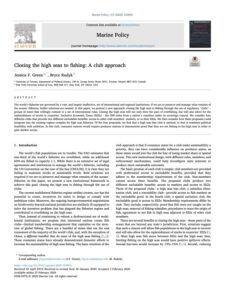The world’s fisheries are governed by a vast, and largely ineffective, set of international and regional institutions. If we are to preserve and manage what remains of the oceans’ fisheries, bolder solutions are needed. In this paper, we present a new approach: closing the high seas to fishing through the use of regulatory “clubs” – groups of states that willingly commit to a set of international rules. Closing the high seas will not only slow the pace of overfishing, but will also allow for the replenishment of stocks in countries’ Exclusive Economic Zones (EEZs) – the 200 miles from a nation’s coastline under its sovereign control. We consider four different clubs that provide two different excludable benefits: access to other club members’ markets, or to their EEZs. We then consider how these proposals could integrate into the existing regime complex for high seas fisheries. Of the four proposals, we find that a high seas ban club is optimal, in that it combines political feasibility with ambition. In this club, consumer nations would require producer nations to demonstrate proof that they are not fishing in the high seas in order to gain market access.

